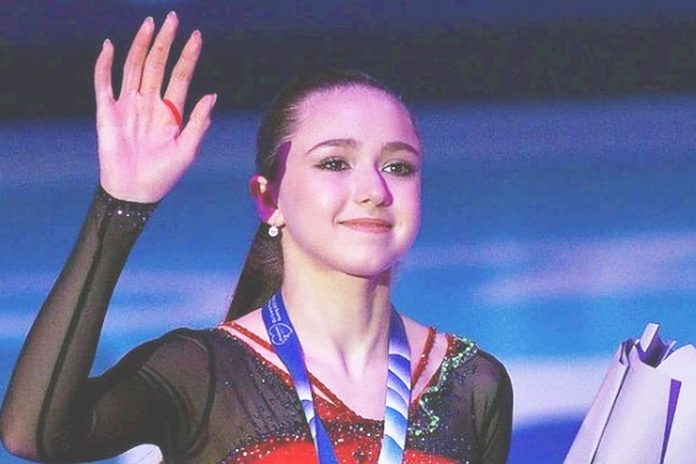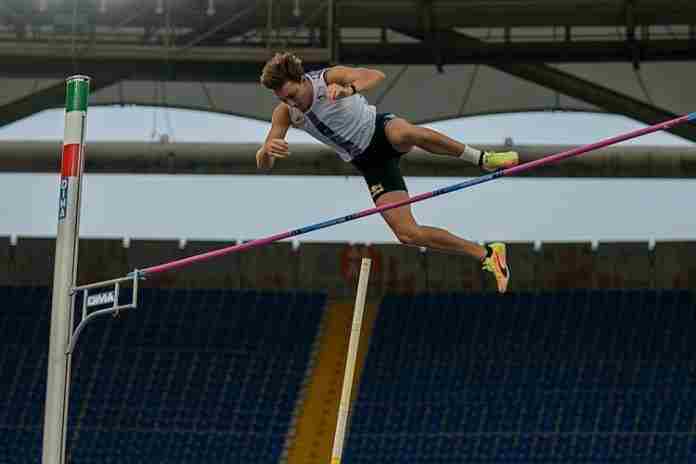★ The Sports Examiner: Chronicling the key competitive, economic and political forces shaping elite sport and the Olympic Movement.★
★ Enjoying our coverage? If so, please consider a donation to help cover technical costs for 2023. Thank you for your support. ★
★ To get The Sports Examiner by e-mail: sign up here! ★
// SHIFFRIN ALERT: Sweep! American ski star Mikaela Shiffrin won Thursday’s Slalom in Semmering, Austria to take all three races there and run her career World Cup win total to 80, now just two behind fellow American Lindsey Vonn for the most ever by a woman! Shiffrin stormed the first run in 49.82 and had a big 0.72-second lead on the field and cruised home in 1:43.26, leading a U.S. 1-2 with Paula Moltzan winning silver in 1:43.55 for her second career World Cup medal! //
This year started with the coronavirus still shredding the international schedule, but the Olympic Winter Games in Beijing came off pretty well, with plenty of magical performances. But just four days after the closing ceremony, everything changed as Russia invaded Ukraine again and set off a conflict that has continued unabated.
Continuing the countdown of our top stories of 2022: nos. 10 to 6 are here, and let’s check out the top five:
5.
World Athletics Champs finally come to U.S., in Eugene
The United States has long been the top nation in track & field, but the World Athletics Championships – which debuted in 1983 – finally came to America only in 2022, at the new Hayward Field in Eugene, Oregon.
The competition was brilliant, with world records in the men’s vault by Mondo Duplantis (6.21 m/20-4 1/2), in the women’s 100 m hurdles by Nigeria’s Tobi Amusan (12.12) and a sensational 50.68 for Sydney McLaughlin of the U.S. in the women’s 400 m hurdles, the first performance ever under 51 seconds in the event.
The U.S. dominated the medal count with 33 (13-9-11), way ahead of Ethiopia, Jamaica and Kenya, with 10 each, with a sweep in the men’s 100 m from Fred Kerley, Marvin Bracy and Trayvon Bromell, an American Record from Noah Lyles in the men’s 200 m (19.31), leading another sweep ahead of Kenny Bednarek and Erriyon Knighton and a third sweep in the men’s shot by Ryan Crouser, Joe Kovacs and Josh Awotunde.
Jamaica’s Shelly-Ann Fraser-Price won the women’s 100 m for an astonishing fifth Worlds gold, leading a sweep with Shericka Jackson and Tokyo Olympic champ Elaine Thompson-Herah. Jackson and Fraser-Pryce went 1-2 in the 200 m and Peru’s Kimberly Garcia won both the 20 km and 35 km women’s walks.
Drama? How about American Kara Winger, who had announced that she would retire at the end of the season, coming from sixth to second on her final throw, the first-ever American medalist in the women’s javelin at the World Championships.
In many ways, however, the story of the 2022 Worlds was its debut in the U.S., at the smallest venue ever to host the event – with about 15,000 seats available for sale – and ticketed attendance averaging just 10,506 on average across all sessions.
U.S. television viewing averaged 1.993 million for the weekend sessions on NBC, down 37% from the NBC average of 3.183 million viewers for the 2021 U.S. Olympic Trials. Most sessions were on cable, with an average of 403,000 U.S. viewers, down 30% from the cablecasts of the 2021 Trials.
Said World Athletics President Sebastian Coe (GBR): “We need to be in this market. It’s important. It’s not punching its weight.
“We want to be back here. It won’t be Eugene. I want to be back into L.A. or Miami or Chicago.”
The Worlds move to Budapest, in a new stadium that will seat 36,000 in 2023 and then to Tokyo’s magnificent, 68,000-seat National Stadium that hosted the 2020 Olympic Games.
4.
Tight Covid controls allow Beijing to host Olympic Winter Games
While the Tokyo 2020 Olympic Games was held with tight controls against the coronavirus, China implemented an air-tight policy, placing the Olympic participants inside a cocoon to ensure not only their health, but sealing off any contamination of the local population.
It worked. The Winter Games was held very successfully, with Norway topping the medal table for the second consecutive Games, with 37 total medals and a record 16 golds. The Russian Olympic Committee – with Russia itself suspended – fielded a team of 212 athletes and won 32 total medals (6-12-14). Germany was third with 27 medals (12-10-5), Canada fourth at 26 (4-8-14), and the U.S. fifth at 25 (8-10-7).
The event was held against a backdrop of protest against Chinese treatment of the Uyghur minority in the Xinjiang Province, and an occasional political statement was offered by the organizing committee’s team during the daily news conferences. Only a few, carefully-screened spectators were allowed at most events.
On the snow, Norwegian stars Johannes Thingnes Boe and Marte Olsbu Roeiseland each won two individual golds in biathlon, and Boe got two more on relays and Roeiseland won a third. Teammate Therese Johaug dominated women’s cross-country skiing with three individual golds and Russian Alexander Bolshunov won two men’s individual golds and a third on a relay. China’s Eileen Gu – born in the U.S. – starred with two Freestyle wins in Big Air and Halfpipe, plus a silver in Slopestyle. American Chloe Kim spectacularly defended her Snowboard Halfpipe gold.
On the ice, German bobsled driver Francesco Friedrich repeated his Two-Man and Four-Man double from 2018, and Germany swept all four luge events. American Nathan Chen and Russian Anna Scherbakova won the men’s and women’s titles in Figure Skating. Sweden’s Nils van der Poel dominated the men’s 5,000 and 10,000 m Speed Skating events, and Dutch star Irene Schouten took the women’s 3,000-5,000-Mass Start wins.
This was the final leg of the Olympic “pivot to Asia” after the 2018 Winter Games in Korea, 2020 (2021) Olympic Games in Japan and 2022 in China. U.S. television ratings sunk to new lows, with the NBC primetime show averaging only 11.4 million viewers across all platforms, a decrease of 42% vs. the PyeongChang Games in 2018 (19.8 million average).
3.
Valieva’s doping positive roils Beijing Games, still not resolved
Russian teen figure skating star Kamila Valieva stands only 5 feet, 3 inches, but she was the biggest story of the Beijing Winter Games. And she still is, months later.
Then 15, Valieva won the European Championships women’s title in January and was the favorite for Beijing. She competed in the Team Event, winning both the Short Program and the Free Skate, with Russia winning the event over the U.S., Japan and Canada on 7 February.
But in the hours following the Team Event came a report that she had tested positive at the Russian nationals on 25 December 2021 for trimetazidine, a prohibited hormone modulator, and the medal ceremony for the Team Event was postponed. Valieva was initially suspended by the Russian Anti-Doping Agency, but the suspension was reversed by a RUSADA Appeals tribunal, clearing her to compete in the women’s Singles, to begin on 15 February.
An appeal to the Court of Arbitration for Sport in Beijing was made, but the panel held that Valieva should be allowed to compete, essentially saying that the doping inquiry should continue, but that if she was cleared, she would be “irreparably harmed” by not having been able to compete.
Valieva won the Short Program in Beijing, but had trouble in the Free Skate, finishing fifth and ending up in fourth place.
After the Games, the controversy has continued. The Russian Anti-Doping Agency undertook a months-long inquiry, said it had competed its work in September, but no hearing was held.
In November, the World Anti-Doping Agency – which had been monitoring the RUSADA process – complained that the investigation had gone on far too long and, under its rules, removed the case from Russia and brought it to the Court of Arbitration for Sport itself, with Valieva assumed to be cleared. That’s still ongoing.
Meanwhile, no medal ceremony was ever held for the Team Event, as the results are still not finalized, pending a final disposition of the Valieva doping case. Now 16, Valieva has competed domestically, but not internationally as Russian skaters have been banned by the International Skating Union over the invasion of Ukraine.
The Valieva story completely changed the focus of the Beijing Games and nearly silenced the recurrent questions about whether China should be hosting the event in view of its human-rights record. And the resolution of the case will be one of the leading stories of 2023, along with how and when the Team Event medals will be awarded.
2.
FIFA holds brilliant first World Cup in winter and the Middle East
Human rights was again a theme at a sporting mega-event as the crescendo of criticism of FIFA’s choice of Qatar as the host of the 2022 FIFA World Cup reached its climax in the months prior to the first match on 20 November.
Seven stadia were built for the event, along with roads and other infrastructure that saw reports of $220 billion in total costs. The event was held in the winter for the first time in order to avoid the stifling summer heat in the Gulf region, causing a contraction of national team training times and problems for many club teams which lost players to national teams competing at the World Cup.
These turned out to be minor compared with the torrent of complaints about migrant-worker rights in Qatar from foreign governments and human rights and labor organizations, as well as Qatari law which bans homosexuality. However, significant changes were made following the award of the World Cup in 2010, including the abolishment of the employer-controlled sponsorship system for workers, a government oversight agency for worker protection and other improvements. Qatari authorities said everyone would be welcome at the event, including gays.
This was hardly enough for the critics, and FIFA President Gianni Infantino (SUI) made a hour-long address to news media on the eve of the tournament, saying, “Today, I feel Qatari. Today, I feel Arab. Today, I feel African. Today, I feel gay. Today, I feel disabled. Today, I feel a migrant worker.”
He then castigated the unrelenting negative media coverage, saying “This moral lesson-giving, one-sided, it’s just hypocrisy.”
Once the tournament started, it was spectacular. The group stage was one of the best ever, with not a single team winning all three of its games and the determination of which teams would advance to the knock-out round coming down to the final match day of each group. In the eliminations, Morocco became the first African (and Arab) nation to advance to the semifinals by beating Portugal and then Spain. Argentina overcame an opening loss to Saudi Arabia (!) to advance past the Netherlands in the quarters on penalty kicks and then beat Croatia, 3-0, in its semi.
Defending champion France got past a very tough England team, 2-1, in the quarters and then handled Morocco, 2-0, in its semis. That set up a classic final, with Argentina taking a 2-0 halftime lead, but French star Kylian Mbappe scoring twice in the final 10 minutes to send the game to extra time. Each side scored once – Mbappe getting a hat trick and Argentina’s Lionel Messi getting a second goal – and the game was decided by penalties for Argentina, 4-2.
Early in the tournament, there were issues with security guards asking fans or even journalists not to wear pro-gay T-shirts or display rainbow flags. But these calmed down as the matches continued. Qatari authorities prevailed and banned beer sales to spectators just a couple of days prior to the start of the tournament (although non-alcoholic beer was sold).
The stadiums were essentially all sold out, and the worldwide television audiences were strong. There were a few deaths during the month-long tournament, including three accredited media, with noted American soccer writer Grant Wahl, 49, suffering an aneurysm in his press section seat near the end of the Argentina-Netherlands quarterfinal and unable to be revived by the medical staff that attended him quickly.
1.
Russia
The Beijing Winter Games and the FIFA World Cup were enormous, worldwide stories that dominated weeks of coverage in 2022, but neither was close to being the biggest story of the year – in sports and elsewhere – the Russian invasion of Ukraine.
Russian autocrat Vladimir Putin had invaded Ukraine before, taking control of the Crimea in February 2014 just four days after the close of the Olympic Winter Games in Sochi, Russia. On 24 February 2022, four days after the close of the Olympic Winter Games in Beijing, Russian forces invaded Ukraine again, with the intent of taking over the entire country.
This was during the period of the “Olympic Truce” endorsed by the United Nations in December 2021 and stretching past the end of the Winter Paralympic Games, scheduled to close on 13 March 2022.
On 28 February, the International Olympic Committee Executive Board announced:
“The IOC EB has therefore today carefully considered the situation and, with a heavy heart, issued the following resolution:
“1. In order to protect the integrity of global sports competitions and for the safety of all the participants, the IOC EB recommends that International Sports Federations and sports event organisers not invite or allow the participation of Russian and Belarusian athletes and officials in international competitions.
“2. Wherever this is not possible on short notice for organisational or legal reasons, the IOC EB strongly urges International Sports Federations and organisers of sports events worldwide to do everything in their power to ensure that no athlete or sports official from Russia or Belarus be allowed to take part under the name of Russia or Belarus. Russian or Belarusian nationals, be it as individuals or teams, should be accepted only as neutral athletes or neutral teams. No national symbols, colours, flags or anthems should be displayed.”
Most federations have followed this plan, with Russian athletes being allowed to compete as neutrals as members of road cycling teams, in judo (Russians entered one tournament only) and tennis.
As the war has raged on and on, with Ukraine making a stiff defense of its homeland, aid for Ukrainian athletes has been organized by the IOC, by individual federations and by National Olympic Committees and national federations around the world, but especially in Europe.
Russian sports officials, have consistently declared that sport is separate from politics and their athletes should be allowed to compete without restrictions, that international competitions without Russia are incomplete and degraded, and exploring the possibility of organizing a new governing body to challenge the IOC.
Through the end of 2022, Russian and Belarusian athletes are still banned and while IOC President Thomas Bach (GER) has talked about eventually finding a way to re-admit them, he has stated that, at present, the bans must continue.
Asked about the best way for Russian athletes to be reinstated, World Athletics chief Coe told reporters in December that Russia should “get out of Ukraine.”
That hasn’t happened yet and despite Russian protests to the contrary, there is no imminent prospect of their return. As the months pass and qualification events for the 2024 Olympic Games are held, more and more windows of opportunity for Russians and Belarusians to get to Paris will close.
This was a hard year in sport; wars do that, as do clashes of culture, and there is no end in sight for either.
Coming after the New Year: picks for the top stories to come in 2023!
Rich Perelman
Editor
You can receive our exclusive TSX Report by e-mail by clicking here. You can also refer a friend by clicking here, and can donate here to keep this site going.
For our updated, 951-event International Sports Calendar for 2022-23 and beyond, by date and by sport, click here!


























